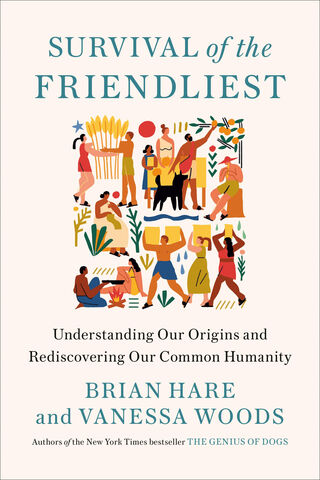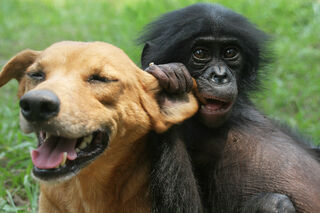Teamwork
Friendliness and Cooperation Are Secrets of Humans' Success
An interview with Brian Hare and Vanessa Woods about their riveting new book.
Posted July 13, 2020
"For over a century, ‘Survival of the Fittest’ has been misconstrued to justify one group of people dominating and abusing another. However, life's most powerful force is Survival of the Friendliest, and is responsible for our species success. Recognizing the role of friendliness in shaping our nature points to our common humanity, and real, lasting solutions to our most vexing problems.
“Very few books even attempt to do what this book succeeds in doing. It begins in basic behavioral science, proceeds to an analysis of cooperation (or lack thereof) in contemporary society, and ends with implications for public policy. Everyone should read this book.”—Michael Tomasello
I recently read a new eye-opening, provocative, and wide-ranging book by Brian Hare, professor in the Department of Evolutionary Anthropology and the Center for Cognitive Neuroscience at Duke University and his wife, Vanessa Woods, an award-winning journalist, research scientist, and director of the Duke Puppy Kindergarten, called Survival of the Friendliest: Understanding Our Origins and Rediscovering Our Common Humanity. I wanted to know about the landmark book and was thrilled that Brian and Vanessa could take the time to answer a few questions about "the mysterious leap in human cognition that allowed Homo sapiens to thrive." Here's what they had to say.
Why did you write Survival of the Friendliest?
Animals are fundamental to understanding ourselves. We cannot understand what it is to be human without first understanding what it is to be not human. We also cannot answer Darwin’s ultimate challenge of demonstrating how natural selection, a purposeless force of nature, created the human mind.

We were motivated to write the book to show just how serious this research program is. Our very nature is revealed by looking in the mirror that other animals provide. The results of what we see profoundly shape our theory of who we are as a species, what we are capable of, and how we can continue to thrive individually, societally, and as a species. We wrote the book to forcefully demonstrate how much we have to gain from appreciating other animals as well as the real-world solutions that this type of research points to for some of our most vexing societal problems.
How does your book relate to your backgrounds and general areas of interest?
We are probably best known for our research with dogs, but we actually work with a wide range of canid and primate species as well as children and adults from a range of cultures. All of our comparisons between different species and populations have helped us realize that friendliness and cooperation are life’s most powerful strategies.
Dogs are exhibit A. The friendliness of dogs allowed them to develop their partnership with humans that drove their success as a species with millions of dogs worldwide. Sadly, wolves are threatened with extinction everywhere they still survive.
Bonobos, our closest living primate relative, are another example. They have never been observed to kill. Yet, chimpanzees, their sister species, kill each other at the rate of some human populations. Bonobo males never dominate their group while all chimpanzee groups have an alpha male. However, the most successful bonobo male, is far more successful at having offspring, than the most successful alpha chimpanzee. Friendliness wins again.
Our work examining friendliness and cooperation in other species led us to consider our own species. Comparing our species to other human species that were alive until the past 50-100,000 years ago, we concluded Homo sapiens is the friendliest species of human to ever evolve. In the book, we argue it is not our big brains, culture, or linguistic abilities that allowed us to be the last human standing. All the extinct human species also had these same traits. We alone survived because we evolved a new form of friendliness on top of traits we inherited from a shared ancestor with other human species.
Who is your intended audience?
We dedicated the book “to all humans” and we mean that literally. We think what we have learned about ourselves from other animals is critical to helping us all celebrate our common humanity. We think it will be especially exciting for animal lovers to see exactly how central other animals are for shaping how we view ourselves and others.
What are some of the topics about which you write and what are some of your major messages?
Survival of the Friendliest is based on the theory of human self-domestication, which was 20 years in the making. It had a humble beginning—Brian uncovering the genius of his dog in his parent’s garage in Atlanta. Weeks after opening their eyes, puppies understand our loving gaze and helpful gestures. These are the same social skills our babies need to participate in culture and learn language. Selection for friendliness gave dogs their human-like intelligence, and this selection occurred naturally without intentional human intervention.

This is the heart of self-domestication. Friendliness pays huge evolutionary dividends, changes appearances, and increases social savviness. We uncover its ubiquity in nature by showing how species from termites to bonobos have been self-domesticated.
When it comes to our own species, compared to extinct humans, Homo sapiens have faces, skulls, and minds altered by self-domestication. Self-domestication allowed us to expand our social networks and innovate at unprecedented levels. We began loving our expanded group as if they were family. However, this same love sowed the seeds of hate. When we feel that the group we love, or its’ identity, is threatened, the same brain system behind our unique compassion shuts down to enable dehumanization. Moral exclusion and cruelty follow.
How does your book differ from others that are concerned with some of the same general topics?
The idea that friendliness led to our success is not new. Neither is the idea that as a species, we became more intelligent. Our discovery lies in the relationship between the two ideas: It was an increase in social tolerance that led to cognitive changes, especially those related to cooperative communication.
We also synthesized social psychology, history, and political science literature, using the lens of the self-domestication hypothesis to identify proven techniques that short-circuit our tendency to dehumanize others. Whether in education, urban planning, or the highest levels of government; in order to survive and thrive, we need to enact strategies that humanize our fellow citizens. Humans and nature will benefit.
Are you hopeful things can change for the better for animals as people learn more about them?
Yes! Our last chapter is called “Circle of Friends” and we explain how research on human-animal relationships suggests why our perception of animals greatly influences our willingness to help other animals as well as each other. This answers the age-old challenge of why we should protect and conserve animals when there is so much human suffering—it humanizes us—which we now need more than ever.
Is there anything else you'd like to tell readers?
For over a century, ‘survival of the fittest’ has been misconstrued to justify one group of people dominating and abusing another. However, life's most powerful force is Survival of the Friendliest, and is responsible for our species success. Recognizing the role of friendliness in shaping our nature points to our common humanity, and real, lasting solutions to our most vexing problems.
References
Bekoff, Marc. The Strange Relationship Between Virtue and Violence. (An interview with Richard Wrangham about his book "The Goodness Paradox" that considers some of the same general topics.)




